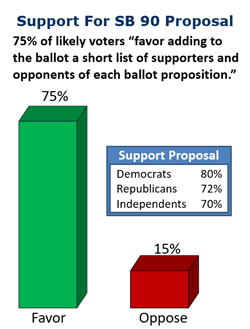 Lobbyists sue to block campaign-finance ballot measure
California lobbyists have filed a lawsuit in Sacramento Superior Court to stop the vote on a ballot measure scheduled for the June primary election that would make them the guinea pig in an experiment on campaign finance. The lobbyists say the measure to make them collectively pay approximately $34 million to fund California's statewide secretary of state campaigns in 2014 and 2018 unfairly restricts their free speech rights and restricts people's constitutional right to petition their government. "Our view is that the First Amendment isn't up for election," said Jackson Gualco, president of the lead plaintiff in the suit, the Institute of Governmental Advocates, and himself a top-level California lobbyist. The lobbyists' lawsuit names Secretary of State Debra Bowen as the respondent, in her capacity as California's election overseer. But the real party of interest is the Legislature, which last year placed the California Fair Elections Act on the June ballot. The measure was signed by Gov. Arnold Schwarzenegger. Authored by former Assemblywoman and current state Sen. Loni Hancock, D-Berkeley, the measure would hit lobbyists, lobbyist employers and lobbying firms for $700 each to help pay for the campaigns for two secretary of state races. "Right now, politicians in Sacramento spend way too much time raising money instead of governing," said Derek Cressman, the Western states regional director for Common Cause. "This would make it possible for candidates to reject big money from special interests and still run a competitive campaign." Hancock's Assembly Bill 583 cleared the Legislature on tight votes that showed no Republican support and a smattering of Democratic opposition. It won only after it was amended to knock out the governor's race and elections for two legislative seats from the pilot project in public financing. The bill was sponsored by the California Clean Money Campaign, the California Nurses Association, other labor, environmental and consumer groups, and Common Cause. Gualco's lobbyist association opposed the bill when it was in the Legislature, along with the California Chamber of Commerce, other business and anti-tax organizations, as well as the state Fair Political Practices Commission and Schwarzenegger's own Department of Finance, even though the governor later approved the measure going to the ballot. The plaintiffs filed the suit Aug. 25 in Superior Court only after they had registered an identical action in U.S. District Court in Sacramento and saw it dismissed June 15 by Judge Frank C. Damrell. The federal judge threw it out on grounds of lack of "ripeness," because voters had yet to approve the measure and there was no imminent threat of damage to lobbyists. Loyola Law School professor Richard L. Hasen, an expert in election law, said the lobbyists can expect another tough legal go when their suit comes up for a scheduled Nov. 20 county court hearing in Sacramento in front of Judge Michael P. Kenny. Hasen said the "ordinary rule" is that lawsuits contesting the constitutionality of ballot measures have to wait until the public votes them in, "on the theory that the voters might turn down the measure and save the court from having to address the constitutional question." "I know the opponents of these measures have argued a different standard would apply to pre-election review of legislatively placed ballot measures," Hasen said. "But I don't know of any authority - although there might be some - that would say the courts would treat those things quickly." If California voters approve the fees on the lobbyists, the legal burden then looks likely to shift onto the measure's supporters. According to a legislative analysis of Hancock's bill, courts in Arizona and Vermont struck down lobbyist fees to fund public campaign financing programs "similar to the one proposed by this bill." The analysis said the courts found the fees "impermissibly burdened" the lobbyists' First Amendment rights. Proponents of the measure think they've got a chance of jumping the First Amendment hurdle because, in the words of Hancock chief of staff Hans Hemann, "there is a direct link" between the lobbyist financing and the secretary of state's office that monitors their activities. "We think we're in good standing," Hemann said. If voters approve the measure, it would raise about $34 million through the $700 assessments on the state's 1,239 registered lobbyists, its 383 lobbying firms and its 3,153 lobbyist employers. To qualify for the public campaign cash, the secretary of state candidates would first have to garner $5 contributions from 7,500 registered voters. Candidates would be allowed to raise $75,000 in seed money through contributions no greater than $100 to get their campaigns going. Along with the Institute of Governmental Advocates, plaintiffs in the suit are Jericho: A Voice for Justice, a nonprofit advocate for low-income people; longtime police union lobbyist Tim Yaryan and his law firm; the Los Angeles Police Protective League; and the California Professional Firefighters. The suit says that if the measure makes it to the June ballot, the plaintiffs "will be faced with having to spend millions of dollars collectively to oppose its adoption by the voters." Lobbyists are demonized as high-priced peddlers of undue influence in capitals from California to the banks of the Potomac. Gualco says any juice his people enjoy is only the result of the organizations that hire them in "the marketplace of ideas." Gualco, whose own firm has done $2 million in business so far this year representing agriculture, water, manufacturing, energy and other interests, said paid professional advocates represent everybody from 4-H Clubs on up and that the advocacy industry reflects "the way our system has matured over the years." "Why do we want to make it more difficult for that marketplace to function?" Gualco asked. "We're already well regulated. All this does is put a tax on us to present our views to the Legislature and the executive branch. People get a chance to make sure their views are directly heard through people like me." Common Cause's Cressman said the lobbyist fees don't stop anybody from saying anything they want to anybody who will listen. He said the ballot measure will open the door to "new types of candidates" who "aren't career politicians." The lobbyists, he said, are trying to roadblock reform with the lawsuit. "I think lobbyists are desperate to maintain the status quo, where they've got a lot of access and influence and ordinary voters don't," Cressman said. "They'll try lawsuits, they'll try anything to keep the edge they've got." See the article on Sacramento Bee website (In accordance with Title 17 U.S.C. Section 107, this material is distributed without profit to those who have expressed a prior interest in receiving the included information for research and educational purposes.) |




